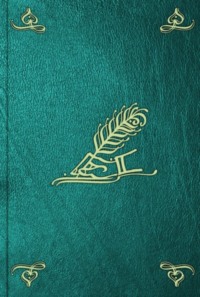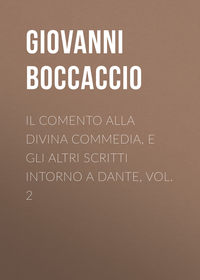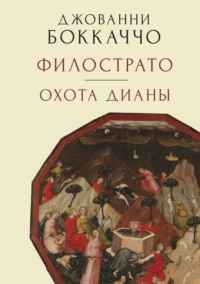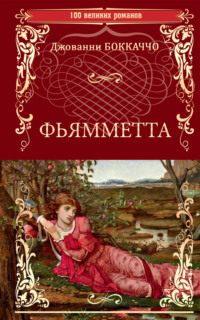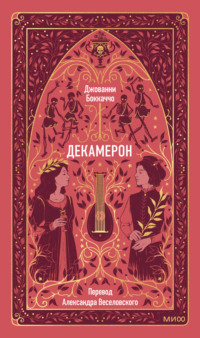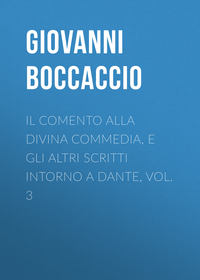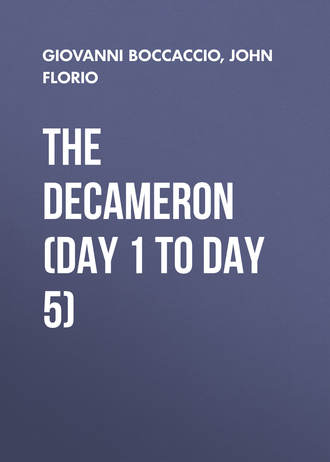 полная версия
полная версияThe Decameron (Day 1 to Day 5)
He that rideth before, is a yong Gentleman, and our Kinsman, who is newly elected Abbot of one of the best Abbeyes in England; & because he is more yong in yeares, then the decrees for such a dignity doe allow, we travaile with him to Rome, to entreat our Holy Father, that his youth may be dispensed withall, and he confirmed in the sayd dignity; but hee is not to speake a word to any person. On rode this new Abbot, sometimes before his traine, and other whiles after, as we see great Lords use to do, when they ride upon the High-wayes.
It chanced on a day, that Alessandro rode somewhat neere to the Abbot, who stedfastly beholding him, perceived that he was a verie comely young man, so affable, lovely, and gracious, that even in this first encounter, he hadde never seene any man before, that better pleased him. Calling him a little closer, he began to conferre familiarly with him, demanding what he was, whence he came, and whether he travelled. Alessandro imparted freely to him all his affaires, in every thing satisfying his demands, and offering (although his power was small) to doe him all the service he could.
When the Abbot had heard his gentle answers, so wisely & discreetly delivered, considering also (more particularly) his commendable carriage; he tooke him to be (at the least) a well-borne Gentleman, and far differing from his owne logger-headed traine. Wherefore, taking compassion on his great misfortunes, he comforted him very kindly, wishing him to live alwayes in good hope. For, if hee were vertuous and honest, he should surely attaine to the seate from whence Fortune had throwne him, or rather much higher. Entreating him also, that seeing he journied towards Tuscany, as he himselfe did the like, to continue still (if he pleased) in his company. Alessandro most humbly thanked him for such gracious comfort; protesting, that he would be alwaies ready, to doe whatsoever he commanded.
The Abbot riding on, with newer crochets in his braine, then hee had before the sight of Alessandro; it fortuned, that after divers dayes of travaile, they came to a small countrey Village, which affoorded little store of lodging, and yet the Abbot would needs lye there. Alessandro, being well acquainted with the Host of the house, willed him, to provide for the Abbot and his people, and then to lodge him where hee thought meetest. Now, before the Abbots comming thither, the Harbinger that marshalled all such matters, had provided for his traine in the Village, some in one place, and others elsewhere, in the best manner that the Towne could yeelde. But when the Abbot had supt, a great part of the night being spent, and every one else at his rest; Alessandro demaunded of the Host, what provision he had made for him; and how hee should be lodged that night?
In good sadnesse Sir (quoth the Host) you see that my house is full of Guests, so that I and my people, must gladly sleepe on the tables & benches: Neverthelesse, next adjoining to my Lord Abbots Chamber, there are certaine Corn-lofts, whether I can closely bring you, and making shift there with a slender Pallet-bed, it may serve for one night, insted of a better. But mine Host (quoth Alessandro) how can I passe thorow my Lords Chamber, which is so little, as it would not allowe Lodging for any of his Monkes? If I had remembred so much (said the Host) before the Curtaines were drawne, I could have lodgd his Monkes in those Corn-lofts, and then both you and I might have slept where now they do. But feare you not, my Lords Curtaines are close drawne, hee sleepeth (no doubt) soundly, and I can conveigh you thither quietly enough, without the least disturbance to him, and a Pallet-bed shal be fitted there for you. Alessandro perceyving, that all this might bee easilie done, and no disease offered to the Abbot, accepted it willingly, & went thither without any noyse at all.
My Lord Abbot, whose thoughtes were so busied about amorous desires, that no sleepe at all could enter his eyes; heard all this talke betweene the Host and Alessandro, and also where hee was appointed to lodge, wherefore he sayd to himselfe. Seeing Fortune hath fitted me with a propitious time, to compasse the happines of my hearts desire; I know no reason why I should refuse it. Perhaps, I shall never have the like offer againe, or ever be enabled with such an opportunity. So, being fully determined to prosecute his intention, and perswading himselfe also, that the silence of night had bestowed sleepe on all the rest; with a lowe and trembling voyce, he called Alessandro, advising him to come and lye downe by him, which (after some few faint excuses) he did, and putting off his cloaths, lay downe by the Abbot, being not a little prowde of so gracious a favour.
The Abbot, laying his arme over the others body, began to imbrace and hugge him; even as amorous friends (provoked by earnest affection) use to do. Whereat Alessandro very much marvayling, and being an Italian himselfe, fearing least this folly in the Abbot, would convert to foule and dishonest action, shrunk modestly from him. Which the Abbot perceiving, and doubting, least Alessandro would depart and leave him, pleasantly smiling, and with bashfull behaviour, baring his stomack, he tooke Alessandroes hand, and laying it thereon, saide; Alessandro, let all bad thoughts of bestiall abuse be farre off from thee, and feele here, to resolve thee from all such feare. Alessandro feeling the Abbots brest, found there two pretty little mountainets, round, plumpe, and smooth, appearing as if they had beene of polished Ivory; whereby he perceived, that the Abbot was a woman: which, setting an edge on his youthfull desires, made him fall to embracing, and immediately he offered to kisse her; but shee somewhat rudely repulsing him, as halfe offended, saide.
Alessandro, forbeare such boldnesse, upon thy lives perill, and before thou further presume to touch me, understand what I shall tell thee. I am (as thou perceivest) no man, but a woman; and departing a Virgin from my Fathers House, am travelling towards the Popes holinesse, to the end that he should bestow me in mariage. But the other day, when first I beheld thee, whether it proceeded from thy happinesse in fortune, or the fatall houre of my owne infelicity for ever, I know not; I conceived such an effectuall kinde of liking towards thee, as never did woman love a man more truly, then I doe thee, having sworne within my soule to make thee my Husband before any other; and if thou wilt not accept mee as thy wife, set a locke upon thy lippes concerning what thou hast heard, and depart hence to thine owne bed againe.
No doubt, but that these were strange newes to Alessandro, and seemed meerely as a miracle to him. What shee was, he knew not, but in regard of her traine and company, hee reputed her to be both noble and rich, as also shee was wonderfull faire and beautifull. His owne fortunes stood out of future expectation by his kinsmens overthrow, and his great losses in England; wherefore, upon an opportunity so fairely offered, hee held it no wisedome to returne refusall, but accepted her gracious motion, and referred all to her disposing. Shee arising out of her bed, called him to a little Table standing by, where hung a faire Crucifix upon the wall; before which, and calling him to witnesse, that suffered such bitter and cruell torments on his Crosse, putting a Ring upon his finger, there she faithfully espoused him, refusing all the World, to be onely his: which being on either side confirmed solemnely, by an holy vow, and chaste kisses; shee commanded him backe to his Chamber, and shee returned to her bed againe, sufficiently satisfied with her Loves acceptation, and so they journied on till they came to Rome.
When they had rested themselves there for some few dayes, the supposed Abbot, with the two Knights, and none else in company but Alessandro, went before the Pope, and having done him such reverence as beseemed, the Abbot began to speake in this manner.
Holy Father (as you know much better then any other) every one that desireth to live well and vertuously, ought to shunne (so farre as in them lieth) all occasions that may induce to the contrary. To the ende therefore, that I (who desire nothing more) then to live within the compasse of a vertuous conversation, may perfect my hopes in this behalfe: I have fled from my Fathers Court, and am come hither in this habite as you see, to crave therein your holy and fatherly furtherance. I am daughter to the King of England, and have sufficiently furnished my selfe with some of his treasures, that your holinesse may bestow me in marriage; because mine unkind Father, never regarding my youth and beauty (inferiour to few in my native Country) would marry me to the King of North-wales, an aged, impotent, and sickly man. Yet let me tell your sanctity, that his age and weakenesse hath not so much occasioned my flight, as feare of mine owne youth and frailety; when being married to him, instead of loyall and unstained life, lewd and dishonest desires might make me to wander, by breaking the divine Lawes of wedlocke, and abusing the royall blood of my Father.
As I travailed hither with this vertuous intention, our Lord, who onely knoweth perfectly, what is best fitting for all his creatures; presented mine eyes (no doubt in his meere mercy and goodnesse) with a man meete to be my husband, which (pointing to Alessandro) is this young Gentleman standing by me, whose honest, vertuous, and civill demeanour, deserveth a Lady of farre greater worth, although (perhaps) nobility in blood be denied him, and may make him seeme not so excellent, as one derived from Royall discent. Holy and religious vowes have past betweene us both, and the Ring on his finger, is the firme pledge of my faith and constancie; never to accept any other man in marriage, but him onely, although my Father, or any else doe dislike it. Wherefore (holy Father) the principall cause of my comming hither, being already effectually concluded on, I desire to compleat the rest of my pilgrimage, by visiting the sanctified places in this City, whereof there are great plenty; And also, that sacred marriage, being contracted in the presence of God onely, betweene Alessandro and my selfe, may by you be publiquely confirmed, and in an open congregation. For, seeing God hath so appointed it, and our soules have so solemnely vowed it, that no disaster whatsoever can alter it: you being Gods vicar here on earth, I hope will not gaine-say, but confirme it with your fatherly benediction, that wee may live in Gods feare, and dye in his favour.
Perswade your selves (faire Ladies) that Alessandro was in no meane admiration, when hee heard, that his wife was daughter to the King of England; unspeakeable joy (questionlesse) wholly overcame him: but the two Knights were not a little troubled and offended, at such a strange and unexpected accident, yea, so violent were their passions, that had they beene any where else, then in the Popes presence, Alessandro had felt their fury, and (perhaps) the Princesse her selfe too. On the other side, the Pope was much amazed, at the habite she went disguised in, and likewise at the election of her husband; but, perceiving there was no resistance to be made against it, hee yeelded the more willingly to satisfie her desire. And therefore, having first comforted the two Knights, and made peace betweene them, the Princesse and Alessandro; he gave order for the rest that was to be done.
When the appointed day for the solemnity was come, hee caused the Princesse (cloathed in most rich and royall garments) to appeare before all the Cardinals, and many other great persons then in presence, who were come to this worthy Feast, which hee had caused purposely to be prepared, where she seemed so faire & goodly a Lady, that every eye was highly delighted to behold her, commending her with no mean admiration. In like manner was Alessandro greatly honoured by the two Knights, being most sumptuous in appearance, and not like a man that had lent money to usury, but rather of very royall quality; the Pope himselfe celebrating the marriage betweene them, which being finished, with the most magnificent pompe that could be devised, hee gave them his benediction, and licenced their departure thence.
Alessandro, his Princesse and her traine thus leaving Rome, they would needes visite Florence, where the newes of this accident was (long before) noysed, and they received by the Citizens in royall manner. There did shee deliver the three brethren out of prison, having first payed all their debts, and reseated them againe (with their wives) in their former inheritances and possessions. Afterward, departing from Florence, and Agolanto, one of the Uncles travailing with them to Paris; they were there also most honourably entertained by the King of France. From whence the two Knights went before for England, and prevailed so succesfully with the King; that hee received his daughter into grace and favour, as also his Sonne in law her husband, to whom hee gave the order of Knighthoode, and (for his greater dignitie) created him Earle of Cornewall.
And such was the noble Spirit of Alessandro, that he pacified the troubles betweene the King and his sonne, whereon ensued great comfort to the Kingdome, winning the love and favour of all the people; and Agolanto (by the meanes of Alessandro) recovered all that was due to him and his brethren in England, returning richly home to Florence, Counte Alessandro (his kinsman) having first dubd him Knight. Longtime hee lived in peace and tranquility, with the faire Princesse his wife, proving to be so absolute in wisedome, and so famous a Souldier; that (as some report) by assistance of his Father in law, hee conquered the Realme of Ireland, and was crowned King thereof.
Landolpho Ruffolo, falling into poverty, became a Pirate on the Seas, and being taken by the Genewayes, hardly escaped drowning: Which yet (neverthelesse) he did, upon a little Chest or Coffer, full of very rich Jewels, being caried thereon to Corfu, where he was well entertained by a good woman; And afterward, returned richly home to his owne houseThe fourth Novell
Whereby may be discerned, into how many dangers a man may fall, through a covetous desire to enrich himselfeMadame Lauretta, sitting next to Madame Pampinea, and seeing how triumphantly shee had finished her discourse; without attending any thing else, spake thus. Gracious Ladies, wee shall never behold (in mine opinion) a greater act of Fortune, then to see a man so suddainly exalted, even from the lowest depth of poverty, to a Royall estate of dignity; as the discourse of Madame Pampinea hath made good, by the happy advancement of Alessandro. And because it appeareth necessary, that whosoever discourseth on the subject proposed, should no way varie from the very same termes; I shall not shame to tell a tale, which, though it containe farre greater mishaps then the former, may sort to as happy an issue, albeit not so noble and magnificent. In which respect, it may (perhaps) merit the lesse attention; but howsoever that fault shall be found in you, I meane to discharge mine owne duty.
Opinion hath made it famous for long time, that the Sea-coast of Rhegium to Gaieta, is the onely delectable part of all Italy, wherein, somewhat neere to Salerno, is a shore looking upon the Sea, which the inhabitants there dwelling, doe call the coast of Malfy, full of small Townes, Gardens, Springs and wealthy men, trading in as many kindes of Merchandizes, as any other people that I know. Among which Townes, there is one, named Ravello, wherein (as yet to this day there are rich people) there was (not long since) a very wealthy man, named Landolpho Ruffolo, who being not contented with his riches, but coveting to multiply them double and trebble, fell in danger, to loose both himselfe and wealth together.
This man (as other Merchants are wont to doe) after hee had considered on his affaires, bought him a very goodly Ship, lading it with divers sorts of Merchandizes, all belonging to himselfe onely, and making his voyage to the Isle of Cyprus. Where he found, over and beside the Merchandizes he had brought thither, many Ships more there arrived, and all laden with the selfe same commodities, in regard whereof, it was needefull for him, not onely to make a good Mart of his goods; but also was further constrained (if hee meant to vent his commodities) to sell them away (almost) for nothing, endangering his utter destruction and overthrow. Whereupon, grieving exceedingly at so great a losse, not knowing what to doe, and seeing, that from very aboundant wealth, hee was likely to fall into as low poverty: hee resolved to dye, or to recompence his losses upon others, because he would not returne home poore, having departed thence so rich.
Meeting with a Merchant, that bought his great Ship of him; with the money made thereof, and also of his other Merchandizes, hee purchased another, being a lighter vessell, apt and proper for the use of a Pirate, arming and furnishing it in ample manner, for roving and robbing upon the Seas. Thus hee began to make other mens goods his owne, especially from the Turkes he tooke much wealth, Fortune being alwayes therein so favourable to him, that hee could never compasse the like by trading. So that, within the space of one yeare, hee had robd and taken so many Gallies from the Turke; that he found himselfe well recovered, not onely of all his losses by Merchandize, but likewise his wealth was wholly redoubled. Finding his losses to be very liberally requited, and having now sufficient, it were folly to hazard a second fall; wherefore, conferring with his owne thoughts, and finding that he had enough, and needed not to covet after more: he fully concluded, now to returne home to his owne house againe, and live upon his goods thus gotten.
Continuing still in feare, of the losses he had sustained by traffique, & minding, never more to imploy his mony that way, but to keep this light vessel, which had holpen him to all his wealth: he commanded his men to put forth their Oares, and shape their course for his owne dwelling. Being aloft in the higher Seas, darke night over-taking them, and a mighty winde suddainly comming upon them: it not onely was contrary to their course, but held on with such impetuous violence; that the small vessell, being unable to endure it, made to land-ward speedily, and in expectation of a more friendly wind, entred a little port of the Sea, directing up into a small Island, and there safely sheltred it selfe. Into the same port which Landolpho had thus taken for his refuge, entred (soone after) two great Carrackes of Genewayes lately come from Constantinople. When the men in them had espied the small Barke, and lockt uppe her passage from getting foorth; understanding the Owners name, and that report had famed him to be very rich, they determined (as men evermore addicted naturally, to covet after money and spoile) to make it their owne as a prize at Sea.
Landing some store of their men, well armed with Crosse-bowes and other weapons, they tooke possession of such a place, where none durst issue forth of the small Barke, but endangered his life with their Darts & Arrowes. Entering aboord the Barke, and making it their owne by full possession, all the men they threw over-boord, without sparing any but Landolpho himselfe, whom they mounted into one of the Carrackes, leaving him nothing but a poore shirt of Maile on his backe, and having rifled the Barke of all her riches, sunke it into the bottome of the sea. The day following, the rough windes being calmed, the Carrackes set saile againe, having a prosperous passage all the day long; but uppon the entrance of darke night, the windes blew more tempestuously then before, and sweld the Sea in such rude stormes, that the two Carracks were sundered each from other, and by violence of the tempest it came to passe, that the Carracke wherein lay poore miserable Landolpho (beneath the Isle of Cephalonia) ran against a rocke, and even as a glasse against a wall, so split the Carracke in peeces, the goods and merchandizes floating on the Sea, Chests, Coffers, Beds, and such like other things, as often hapneth in such lamentable accidents.
Now, notwithstanding the nights obscurity, and impetuous violence of the billowes; such as could swimme, made shift to save their lives by swimming. Others caught hold on such things, as by Fortunes favour floated neerest to them, among whom, distressed Landolpho, desirous to save his life, if possibly it might be, espied a Chest or Coffer before him, ordained (no doubt) to be the meanes of his safety from drowning. Now although the day before, he had wished for death infinite times, rather then to returne home in such wretched poverty; yet, seeing how other men strove for safety of their lives by any helpe, were it never so little, he tooke advantage of this favour offred him, and the rather in a necessitie so urgent. Keeping fast upon the Coffer so well as he could, and being driven by the winds & waves, one while this way, and anon quite contrarie, he made shift for himselfe till day appeared; when looking every way about him, seeing nothing but clouds, the seas and the Coffer, which one while shrunke from under him, and another while supported him, according as the windes and billowes carried it: all that day and night thus he floated up and downe, drinking more then willingly hee would, but almost hunger-starved thorow want of foode. The next morning, either by the appointment of heaven, or power of the Windes, Landolpho who was (well-neere) become a Spundge, holding his armes strongly about the Chest, as wee have seene some doe, who (dreading drowning) take hold on any the very smallest helpe; drew neere unto the shore of the Iland Corfu, where (by good fortune) a poore woman was scowring dishes with the salt water and sand, to make them (house-wife like) neate and cleane.
When shee saw the Chest drawing neere her, and not discerning the shape of any man, shee grew fearefull, and retyring from it, cried out aloude. He had no power of speaking to her, neither did his sight doe him the smallest service; but even as the waves and windes pleased, the Chest was driven still neerer to the Land, and then the woman perceived that it had the forme of a Cofer, and looking more advisedly, beheld two armes extended over it, and afterward, shee espied the face of a man, not being able to judge, whether he were alive, or no. Moved by charitable and womanly compassion, shee stept in among the billowes, and getting fast holde on the haire of his head, drew both the Chest and him to the Land, and calling forth her Daughter to helpe her, with much adoe shee unfolded his armes from the Chest, setting it up on her Daughters head, and then betweene them, Landolpho was led into the Towne, and there conveyed into a warme Stove, where quickly he recovered (by her pains) his strength benummed with extreame cold.
Good wines and comfortable broathes shee cherished him withall, that his sences being indifferently restored, hee knew the place where he was; but not in what manner he was brought thither, till the good woman shewed him the Cofer that had kept him floating upon the waves, and (next under God) had saved his life. The Chest seemed of such slender weight, that nothing of any value could be expected in it, either to recompence the womans great paines and kindnesse bestowne on him, or any matter of his owne benefit. Neverthelesse, the woman being absent, he opened the Chest, and found innumerable precious stones therein, some costly and curiously set in gold, and others not fixed in any mettall. Having knowledge of their great worth and value (being a Merchant, and skild in such matters) he became much comforted, praysing God for this good successe, and such an admirable meanes of deliverance from danger.
Then considering with himselfe, that (in a short time) hee had beene twice well buffeted and beaten by Fortune, and fearing, least a third mishap might follow in like manner; hee consulted with his thoughts, how he might safest order the businesse, and bring so rich a booty (without perill) to his owne home. Wherefore, wrapping up the Jewels in very unsightly cloutes, that no suspition at all should be conceived of them, hee saide to the good woman, that the Chest would not doe him any further service; but if shee pleased to lende him a small sacke or bagge, shee might keepe the Cofer, for in her house it would divers way stead her. The woman gladly did as he desired, and Landolpho returning her infinite thankes, for the loving kindnesse shee had affoorded him, throwing the sacke on his necke, passed by a Barke to Brundusiam, and from thence to Tranium, where Merchants in the City bestowed good garments on him, hee acquainting them with his disasterous fortunes, but not a word concerning his last good successe.


